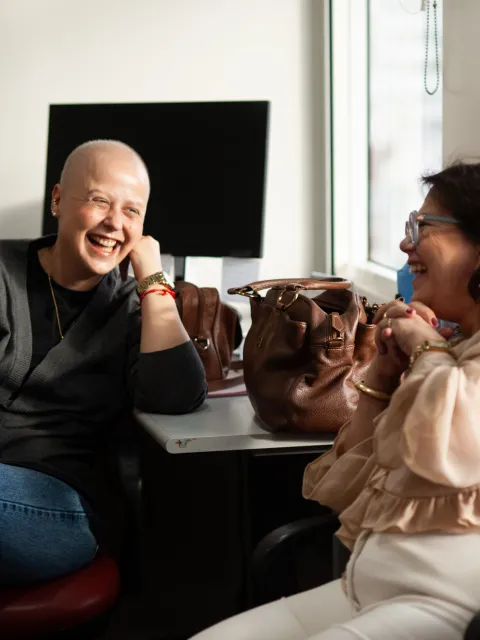UICC announces first C/Can 2025 Challenge Cities: Kigali and Porto Alegre
21 May 2018 – Geneva, Switzerland: Today, UICC announced that the cities of Porto Alegre, Brazil and Kigali, Rwanda have been selected to join the C/Can 2025: City Cancer Challenge (C/Can 2025) initiative as Challenge Cities.

They will become part of a collective movement of cities supported by a network of global and local partners to deliver quality, equitable and sustainable cancer treatment solutions.
Led by the Union for International Cancer Control (UICC), C/Can 2025: City Cancer Challenge is a multisectoral initiative supporting cities to take the lead in the design, planning and implementation of cancer treatment solutions.
As Challenge Cities, Porto Alegre and Kigali will be supported over two years to:
- Identify and engage all relevant stakeholders in the C/Can 2025 process including government (local, regional, national), civil society, academia, healthcare facilities and professionals, private sector
- Undertake a comprehensive city-wide assessment to identify current gaps, needs and priorities for developing sustainable cancer care solutions in the city
- Develop a costed activity plan
- Depending on the activity, identify appropriate channels for technical assistance, partnerships/collaboration locally and internationally, one-off investments, and/or longer term financing solutions to support implementation of the city plan
- Develop a framework to monitor and evaluate progress and impact.
UICC and the cities of Porto Alegre and Kigali have now signed letters of intent outlining their commitment to work together in the coming weeks on the development of a full Memorandum of Understanding and schedule of work, which will underpin and support the implementation of C/Can 2025 in the cities.
Speaking about what motivated Porto Alegre to become a C/Can 2025 Challenge City, Dr Erno Harzheim, Secretary for Health, City of Porto Alegre stated, “Non-communicable diseases including cancer account for 75% of deaths in Porto Alegre. Although the city offers a service network covering the full cancer care continuum, improving the efficiency of this network so that it delivers high quality and timely care, adapted to the local reality is critical.”
The cities of Kigali and Porto Alegre were among those to respond to UICC’s call to action in November 2017, inviting cities that are committed to improving access to quality cancer treatment and care to apply to become C/Can 2025 Challenge Cities. Applicant cities were required to commit to the C/Can 2025 principles of engagement including to partner with both the public and private sectors, and to take a participatory and transparent approach to the planning and implementation of cancer treatment solutions, be patient-centred; demonstrate commitment to the implementation of core cancer and NCD control measures; and provide evidence of an engaged city leadership, and cancer and NCD community that could drive the initiative in the city.
Kigali, Rwanda“Through C/Can 2025, the city of Kigali has the opportunity to deliver a more effective cancer treatment solution leveraging existing infrastructure at different levels of the healthcare system in the city, as well as a good partnership with key stakeholders, including the Ministry of Health and civil society, implementing cancer and NCD related activities,” shared Patricia Muhongerwa, Vice Mayor in charge of Social Affairs, City of Kigali.
Over the next three months, the C/Can 2025 team will continue reviewing applicant cities through a number of site visits, with a second set of Challenge Cities to be announced later in the year.
“Building on our experiences over the last twelve months with the first four C/Can 2025 Key Learning Cities, we are excited to be now entering this new phase of C/Can 2025, working to create a scalable model which can be taken to cities around the world,” remarked Professor Sanchia Aranda, UICC President.
- ENDS –
Notes to editors
About the Union for International Cancer Control (UICC)
UICC is the largest international cancer-fighting organisation, with over 1,065 member organisations across 164 countries representing the world's major cancer societies, ministries of health, research institutes, treatment centres and patient groups. The organisation is dedicated to taking the lead in convening, capacity building and advocacy initiatives that unite the cancer community to reduce the global cancer burden, promote greater equity, and integrate cancer control into the world health and development agenda. UICC and its multisectoral partners are committed to encouraging governments to look towards the implementation and scale-up of quality and sustainable programmes that address the global burden of cancer and other NCDs. UICC is also a founding member of the NCD Alliance, a global civil society network that now represents almost 2,000 organisations in 170 countries.
For more information, please visit: www.uicc.org
Media contacts:
Vanessa Von der Muhll
Email: vondermuhll@uicc.org
Last update
Friday 07 June 2019
